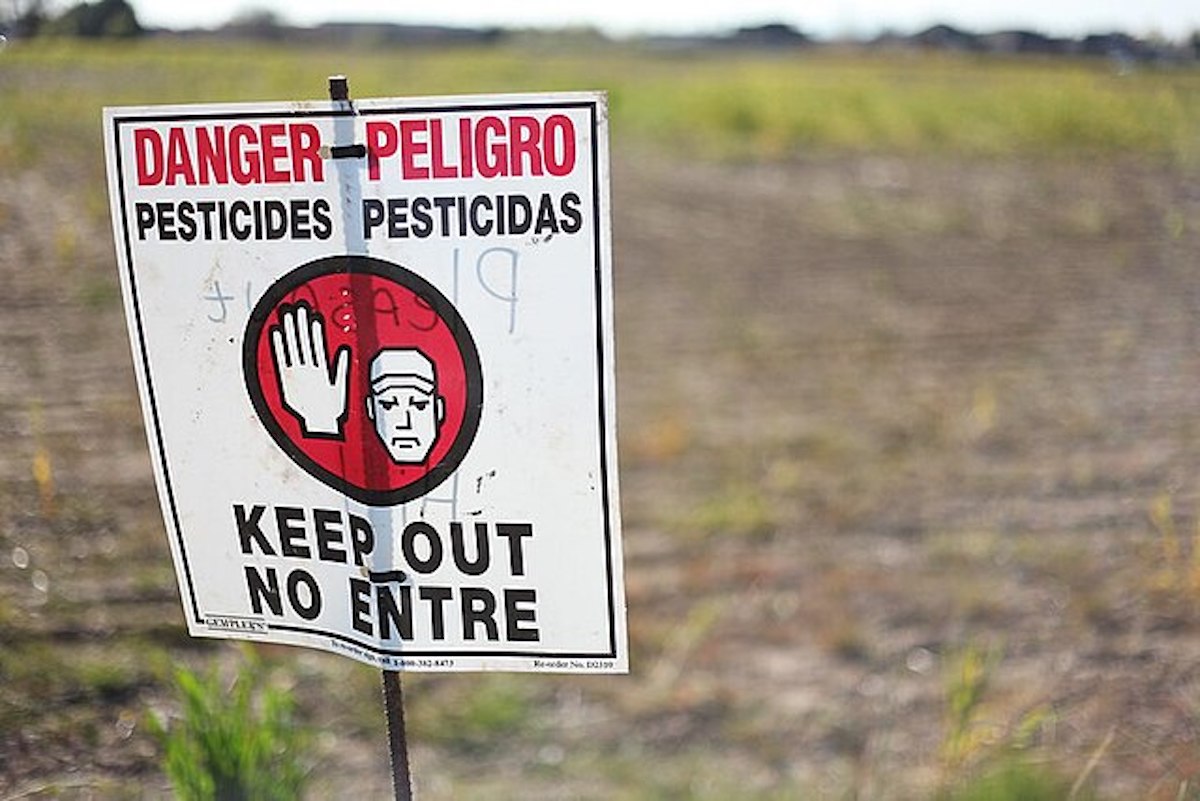Toxic Herbicide Endangering Pregnant Farmworkers and Babies
Santa Barbara County and EPA Warn Farmers That Herbicide DCPA, or Dacthal, Has 'Serious, Permanent, and Irreversible Health Risks'

Farmers in Santa Barbara County are being warned about the extreme health risks of DCPA, a toxic herbicide particularly dangerous to pregnant individuals and developing babies.
DCPA, or Dacthal, is widely used for weed control on golf courses, athletic fields, and vegetables such as broccoli and cauliflower — two of the county’s top crops. In 2022, Santa Barbara County ranked fifth in California for DCPA use, totaling nearly 11,000 pounds, according to a May 2024 report by the Department of Pesticide Regulation.
The Environmental Protection Agency (EPA) highlighted the herbicide’s “serious, permanent, and irreversible health risks” in an April press release. Pregnant women are especially at risk due to potential changes in fetal thyroid hormone levels, which are linked to issues such as low birth weight, impaired brain development, decreased IQ, and compromised motor skills later in life.

Chemical exposure has long put local farmworkers’ health at risk, said Erica Diaz-Cervantes, a senior policy advocate with Central Coast Alliance United for a Sustainable Economy (CAUSE).
In short, this is nothing new.
“This is just reaffirming what farmworkers have been experiencing — especially when farmworkers’ health symptoms have often been invalidated,” Diaz-Cervantes said.
She added that many pregnant farmworkers are denied disability leave until they are nearly seven months into pregnancy — when they are so far along that they are physically unable to work — limiting their ability to protect themselves and their babies from exposure.
Diaz-Cervantes noted that despite workers’ awareness of pesticide risks, they often face pressure from employers to work in recently sprayed areas under the belief that it is safe.
The EPA said it would be pursuing action to address the herbicide’s risks “as quickly as possible.”
The agency issued a letter to AMVAC, the sole manufacturer of Dacthal, reiterating the hazards identified and indicating their intent to safeguard workers and others who could be exposed — including taking the “rare step” of warning farmworkers directly due to the significant risks uncovered. It is currently conducting a “registration review” of DCPA, a process of reevaluating pesticides every 15 years to ensure they have no negative effects on human health or the environment. Corresponding DCPA data had to be squeezed out of its manufacturer, and was nearly a decade overdue according to the EPA.
A May 2023 assessment found “concerning evidence of health risks associated with DCPA application,” even when protective equipment was used. Pregnant individuals handling DCPA may face exposures up to 20 times higher than deemed safe by current product labels.
The EPA also discovered that product labels underestimate the time required for areas treated with DCPA to become safe for work.
While a 12-hour restriction is recommended, evidence suggests DCPA levels can remain hazardous for 25 days or longer after application, including on golf courses and athletic fields. “Spray drift” from DCPA application also threatens developing babies and pregnant women residing near treated areas.
“It’s imperative that we warn people about those risks now,” said Michal Freedhoff, assistant administrator for the office of chemical safety and pollution prevention. “We’re committed to taking action to protect the health of children, workers, and others who are exposed to DCPA.”
However, as said by Diaz-Cervantes, the process of banning these harmful chemicals is “not fast enough to be able to protect workers,” especially when “workers have developed health symptoms in correlation to pesticide exposure, and yet, that’s something that is still not widely addressed, or even then just validated overall.”

Since the EPA’s May 2023 assessment of Dacthal, AMVAC proposed changes, including canceling all DCPA products for use on turf. However, while golfers and athletes may be safe, the EPA found AMVAC’s other proposals “insufficient” in addressing serious health risks for those who work with and around DCPA, including farmworkers.
In response, the EPA plans to take action to suspend or cancel DCPA under the Federal Insecticide, Fungicide, and Rodenticide Act (FIFRA), but proceedings can take several months to several years to see through due to procedural requirements.
In the meantime, the county is warning the region’s growers.
“Following the release of this information, our department spoke to all farms and pest control businesses in the county that had recently reported use of products containing DCPA, and provided them information on the health risks cited by the EPA,” said Noah Beyeler, the County’s Deputy Agricultural Commissioner.
The department also provided information on alternatives to Dacthal included in the Department of Pesticide Regulation’s report.
To protect pregnant farmworkers now, CAUSE has partnered with San Francisco–based law firm Worklife Law to launch “Dar a Luz,” meaning “bring to light” in Spanish (an idiom for giving birth). This initiative aims to raise awareness about the health needs and legal rights of farmworkers during pregnancy, childbirth, and nursing.
CAUSE has developed educational materials and resources for communities like Santa Maria and Guadalupe, educating workers — 50 percent of whom are women — about specific hazards and self-protection measures. The project also fosters better communication between workers, advocates, and medical providers.
Currently, their focus includes advocating for earlier state disability leave for pregnant farmworkers.
“We’re striving to reach as many workers as possible,” said Diaz-Cervantes. “These new warnings validate what workers have been saying for a long time, and really emphasize the need to address these issues. It’s crucial to evaluate what is being sprayed in the workplace, especially for women working late into their pregnancies. Immediate action is needed to ensure their health and safety.”
To learn more about the EPA’s review of Dacthal, visit here.
Premier Events
Sun, Jan 26
11:00 AM
Santa Barbara,
17th Annual Santa Barbara Community Seed Swap 2025
Fri, Jan 31
5:00 PM
Santa Barbara
Artist Talk at Art & Soul on State Street
Sun, Jan 26
11:00 AM
Santa Barbara,
17th Annual Santa Barbara Community Seed Swap 2025
Tue, Jan 28
5:00 PM
Zoom
Fire Safety Community Zoom Meeting
Thu, Jan 30
8:00 PM
Solvang
Lucinda Lane Album-Release Show, at Lost Chord Guitars
Fri, Jan 31
9:00 AM
Goleta
AARP FREE TAX PREPARATION
Fri, Jan 31
5:00 PM
Santa Barbara
Artist Talk at Art & Soul on State Street
Sat, Feb 08
10:00 AM
Santa Barbara
Paseo Nuevo Kids Club
Sat, Feb 08
12:30 PM
Solvang
Garagiste Wine Festival
Tue, Feb 11
8:00 PM
Santa Barbara
SBIFF – Tribute to Timothée Chalamet
Thu, Feb 13
8:00 PM
Santa Barbara
SBIFF – Tribute to Adrien Brody and Guy Pierce
Sun, Jan 26 11:00 AM
Santa Barbara,
17th Annual Santa Barbara Community Seed Swap 2025
Fri, Jan 31 5:00 PM
Santa Barbara
Artist Talk at Art & Soul on State Street
Sun, Jan 26 11:00 AM
Santa Barbara,
17th Annual Santa Barbara Community Seed Swap 2025
Tue, Jan 28 5:00 PM
Zoom
Fire Safety Community Zoom Meeting
Thu, Jan 30 8:00 PM
Solvang
Lucinda Lane Album-Release Show, at Lost Chord Guitars
Fri, Jan 31 9:00 AM
Goleta
AARP FREE TAX PREPARATION
Fri, Jan 31 5:00 PM
Santa Barbara
Artist Talk at Art & Soul on State Street
Sat, Feb 08 10:00 AM
Santa Barbara
Paseo Nuevo Kids Club
Sat, Feb 08 12:30 PM
Solvang
Garagiste Wine Festival
Tue, Feb 11 8:00 PM
Santa Barbara
SBIFF – Tribute to Timothée Chalamet
Thu, Feb 13 8:00 PM
Santa Barbara























You must be logged in to post a comment.